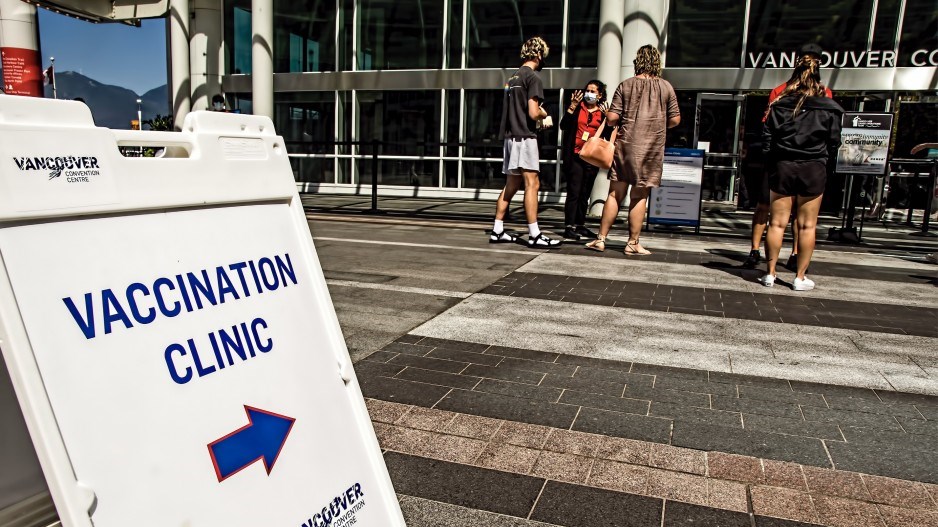As some COVID-19 vaccination clinics reduce capacity during the holidays even amid surging cases of the highly transmissible Omicron variant, British Columbians will be left to wait until next month for the return of mass vaccination clinics to help administer third doses.
Vancouver Coastal Health Authority is set to reopen its mass vaccination clinic at the Vancouver Convention Centre January 5.
This is meant to serve the entire Lower Mainland, meaning some local residents will need to leave their communities for a jab in downtown Vancouver.
But Fraser Health Authority — which also serves the Lower Mainland — is in the midst of securing a mass vaccination site of its own in Surrey’s Guildford neighbourhood, with “others to come,” according to a PowerPoint presentation government officials offered to reporters Tuesday.
Vancouver Island Health Authority is set to open a mass vaccination clinic in Victoria as well as clinics in other regional centres, while the Interior Health Authority is “securing larger space in a number of centres,” according to the presentation.
Northern Health Authority is developing a plan to deploy mobile clinics to administer boosters.
These larger clinics will be operating at the same time as pharmacies and smaller clinics are also administering doses across the province.
Provincial officials have come under increasing pressure to ramp up B.C.’s booster vaccination campaign as the emergence of the Omicron variant has provinces such as Ontario rapidly expanding eligibility for third doses.
B.C.’s strategy since the outset of the mass vaccination campaign that got underway almost exactly a year ago has been to focus on specific age groups and higher-risk populations, generally staggering eligibility based on descending age brackets.
Those initial efforts were targeting those ages 70 years and older, Indigenous populations in rural locations, residents in long-term-care and assisted-living, the immunosuppressed and health-care workers who received their initial two doses at a shorter interval than the general population.
Eligibility has since expanded to some younger age brackets and those who received two AstraZeneca plc doses rather than at least one dose of an mRNA product, such as those made by Pfizer Inc. (NYSE:PFE) or Moderna Inc. (NYSE:MRNA).
But booster doses for the bulk of the general population are not expected to be administered until January, February and March.
Ontario opened up eligibility to all its residents 18 and older as of this week and Alberta on Tuesday opened it up to those 18 and older, so long as it’s been five months since their second shot.
“Our program has and needs to be scaling up to make sure that those who need it most get it first,” provincial health officer Dr. Bonnie Henry said during a briefing later in the day.
But B.C. Health Minister Adrian Dix insisted during a Tuesday briefing that B.C. would be sticking to its age-based program.
The province has so far administered 727,761 booster shots to its five million residents as of Sunday evening since first embarking on its booster campaign in September. To date, 4.1 million B.C. residents have received at least two doses.
The province estimates it will have administered an additional 320,000 doses between the start and end of January, with 130,000 of those doses happening at the Vancouver Convention Centre.
The province administered 63,693 doses on December 20 – the highest number in a single day since August 16.
Health officials have previously said part of the reasoning for sticking to its booster road map is so that third doses are administered at a long enough interval to provide maximum protection rather than shorter intervals between doses that would reduce protection against COVID-19 and its variants.
B.C.’s goal is to administer third doses at least six months after recipients’ second doses in a bid to maximize protection.
“We’re also in a very different situation than places like Ontario, which did not go to that extended interval early on,” Henry said, adding younger people have “good, strong protection” against the kind of severe illness that would see them hospitalized.
About 500 pharmacies across B.C. are administering shots as part of the latest vaccination campaign. About 1,000 pharmacies are expected to be administering doses by mid-January.
Meanwhile, the province also revealed it was introducing new restrictions meant to curb against the rise of Omicron.
“It is inevitable now that most of us in the province will be exposed at some point the way this virus is being transmitted,” Henry said.
“How it affects us depends on our own actions.”
Beginning end of day Wednesday and stretching to January 18, no indoor organized events of any size will be allowed in the province. That includes small weddings and funeral receptions.
Bars, night clubs, gyms and dance studios will be shuttered during this four-week period as well.
Last week saw the introduction of new measures requiring seated venues hosting more than 1,000 people – for example, Rogers Arena, where the Vancouver Canucks play – cut down to 50% capacity.
Those capacity limits now apply to venues of all sizes, such as concerts and cinemas.
All sports tournaments across the province will have to be cancelled and restaurants will once again need to limit tables to parties of six, plus set up physical barriers or distancing.




